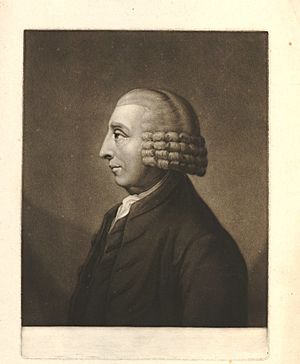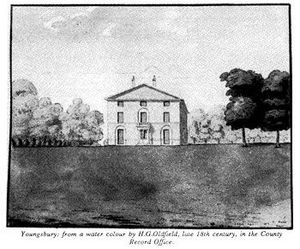David Barclay of Youngsbury facts for kids
Quick facts for kids
David Barclay
|
|
|---|---|

David Barclay, engraving by Richard Earlom.
|
|
| Born | 1729 |
| Died | 1809 (aged 79–80) |
| Occupation | Businessman, merchant, banker |
David Barclay of Youngsbury (1729–1809) was an important English Quaker businessman, merchant, and banker. He is remembered for a special project where he freed people who were enslaved on a Jamaican farm he owned. He then helped them start new lives in Pennsylvania, USA. David Barclay also played a role in the early history of what is now Barclays Bank, a very famous bank. He was also involved in the brewing industry, which makes drinks like beer.
Contents
Who Was David Barclay?
David Barclay came from a family of bankers and merchants. His father, David Barclay of Cheapside, was a Scottish banker. His mother, Priscilla Freame, was the daughter of another banker named John Freame. This family background helped David Barclay become a successful businessman himself.
How Barclays Bank Started
The bank that David Barclay and his brother John inherited was first known as the Freame Bank. It started way back in the early 1700s. Over time, the bank's name changed often. But from the mid-1770s, it was usually called Barclay, Bevan & Co. This bank eventually grew into the huge Barclays Bank we know today.
David Barclay and America
David Barclay did a lot of business with the American colonies. He had strong connections, especially in Pennsylvania. Around 1760, his company, David Barclay & Sons, worked with merchants in New York and Philadelphia. They even supplied goods to the British military in North America.
Before the American War of Independence started, Barclay worked with Benjamin Franklin, a famous American. The Barclay brothers used their knowledge of America to make smart business choices. They stopped selling goods on commission and slowly reduced their trade across the Atlantic Ocean. After the war, they completely stopped their linen trade.
In the 1770s, when tensions grew between Britain and America, David Barclay led a group of North American merchants. They wanted the British government to get rid of the Stamp Act 1765, which was a tax on American colonies. However, Barclay did not agree with the extreme actions taken by some colonists.
In 1774, he met with Benjamin Franklin in London to talk about the growing problems. Franklin, Barclay, and John Fothergill even wrote a plan to solve the issues after the Boston Tea Party. Barclay also tried to stop moves against American fishing rights, but he wasn't successful.
After the American War of Independence, American Quakers who wanted to end slavery came to London. Barclay felt they were too impatient. He helped guide their efforts to get politicians to listen to the case for ending slavery, and they had some success.
Barclay and the Brewery Business
In 1781, David Barclay and some partners bought the Anchor Brewery, Southwark. This brewery was part of the estate of Henry Thrale, who had just passed away. Barclay approached Thrale's widow, Hester Thrale, to buy a share in the business.
This deal was a family matter and involved his nephews. David Barclay invested a large sum of money, £135,000, into the company. The brewery's name changed from "H. Thrale and Company" to "Barclay Perkins and Company" in 1798. This company later joined with Courage Brewery in 1955.
Youngsbury Estate
In 1769, Barclay bought a large estate called Youngsbury in Hertfordshire. He made the house bigger and better. A famous landscape designer, Capability Brown, created a beautiful winding lake for the estate in 1770.
Barclay sold Youngsbury in 1793 after his second wife passed away. He became friends with John Scott of Amwell, another Quaker who lived nearby. Barclay also met Samuel Johnson, a famous writer, through the brewery deal. Johnson even left Barclay money in his will.
Helping Others: Philanthropy
One of David Barclay's most notable acts was in 1794. He decided to free the people he owned on his farm in Jamaica. He and his brother had received this farm, called Unity Valley Pen, because someone owed them money. They were surprised to find themselves owning about 30 enslaved people.
Barclay wrote that after his brother died, he decided to try freeing them. He believed that keeping people enslaved was wrong, both for Christians and for human rights. He hired a ship to take them to America. His agent was told to take them to Philadelphia and make sure they were free. The Pennsylvania Abolition Society then helped these people learn skills like manual trades and domestic service.
In his banking business, Barclay spoke out against banks funding the slave trade. However, he couldn't stop all such financing.
Barclay also supported John Whitehead by giving him money each year. He was also very involved in helping to start Ackworth School, a Quaker school in Yorkshire, England.
David Barclay's Family Life
David Barclay was married twice. He had one child who lived to be an adult. His daughter, Agatha, married Richard Gurney. Their son, Hudson Gurney, became a well-known person.
Barclay made sure his grandson, Hudson Gurney, received a good education. Hudson studied at Youngsbury with Thomas Young, who was a brilliant scientist. Young also stayed at Barclay's London home, where he could attend lectures.
David Barclay came from a very large family. He once guessed that about 300 people called him "uncle or cousin"! In his later years, Barclay lived in Walthamstow.
See also
 | James Van Der Zee |
 | Alma Thomas |
 | Ellis Wilson |
 | Margaret Taylor-Burroughs |


